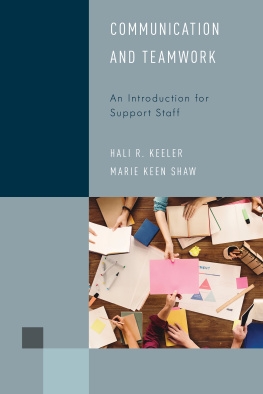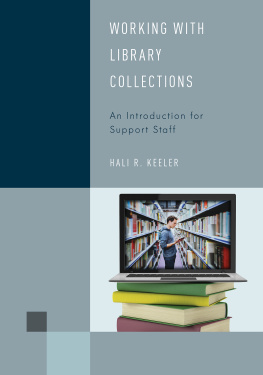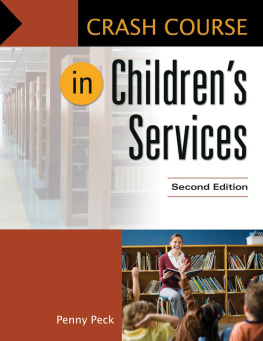Hali R. Keeler has been an adjunct professor since 1998 in the Library Technology program at Three Rivers Community College in Norwich, CT, where she formerly served as program coordinator. She teaches library public services, library technical services, and management strategies. Hali also served as a special faculty consultant for Charter Oak State College, performing portfolio reviews for their students in the area of library science. Hali earned her M.L.S. from the University of Rhode Island and has a M.A. in French. Retired after 35 years in public library service as a childrens librarian and as a library director, she has been a longtime member of the American Library Association, Public Library Association, and the Connecticut Library Association.
There are several people Id like to thank for their efforts on my behalf:
- My sincere thanks go to my colleague Marie Shaw for her continued support, advice, and friendship.
- Thank you to my publisher, Charles Harmon, for his encouragement, support, and patience. I am grateful for the opportunity to create this second edition.
- With love and appreciation to my husband, Gerry.
- To all the students and support staff I have worked with over the years. I am still learning from you.
Library Support Staff (LSS) know the mission and roles of a library in its community, and the mission of libraries in general. They will know the values of the profession, including an understanding of the Library Bill of Rights, the ALA Code of Ethics, freedom of information, confidentiality of library records, and privacy issues. They will also know the roles of Library Support Staff and other staff in libraries.(ALA-LSSC Competency #1, #2, #3)
Topics Covered in This Chapter:
How Libraries Serve Society
Library Ethics
Library Users
Different Types of Libraries
Public Libraries
School Libraries
Academic Libraries
Special Libraries
Staffing
Public and Technical Services
Key Terms:
- Cross-training: Cross-training is the practice of training personnel in more than one role or skill in a library, such as in public and technical services.
- Demographics: Demographics are the statistics of a given population by age, sex, race, and income. This is important for libraries so they can know whom they are serving, and for whom they can provide the appropriate resources.
- Digital divide: Digital divide refers to the gap between demographics and regions that have access to modern information and communications technology, and those that dont or have restricted access. Libraries can fill this gap.
- Ethics: Moral principles that govern a persons behavior or the conducting of an activity. Ethics are crucial to how library support staff conduct themselves in the library.
- Library Bill of Rights: The Library Bill of Rights is a document created by the American Library Association, affirming basic policies that guide library service. It is based on the principles of the US Constitution and guides librarians in providing equal service to all patrons.
- Library Code of Ethics: The Library Code of Ethics is a document created by the American Library Association that recognizes the ethical responsibilities of library personnel toward the public, and guides how the public is served.
- Public services: Public services are those tasks performed by library support staff that involve direct contact with the customer. It includes the circulation and reference functions as well as helping the patron find materials of interest for research or pleasure reading and helping them with library computers and equipment. Public services also includes functions of interlibrary loan and reserves.
- Technical services: Technical services are those tasks performed by library staff associated with selecting and preparing new materials for circulation, such as adding barcodes, spine labels, and plastic covers, so the materials can be protected and ownership can be identified. It also includes cataloging and classification of materials; acquisitions; and the mending, repair, and preservation of materials.
- Third place: Third place is understood to be the place that is neither home (first place) nor work (second place). Third place can be the local coffee shop, church, or, for our purposes, the library.
Libraries are everywhere: in large urban cities and in small suburban towns; in rural communities and in schools and colleges. They are likely an institution with which everyone is familiar and are seen as safe and neutral places. They are often considered the third place, somewhere to go that is not home or work. Cabello and Butler write,
A reason public libraries are seen as such important third-place institutions is that they and their librarians have taken on other functions beyond lending out books. In many communities, librarians are ad hoc social workers and navigators. They help local people figure out the complexities of life[,] providing advice and connections to health, housing, literacy and other areas.
As we will see, libraries hold a well-fixed place in society.
HOW LIBRARIES SERVE SOCIETY
Libraries are firmly connected to their locale. Libraries serve this society in the most fundamental way by providing free and equal access to all of its resources. They do this by acquiring, organizing, and storing information, and by assisting people to find what they need. Everyone needs information for daily work, for learning, and for recreation. Libraries are one way to provide large numbers of people with large quantities of information at a reasonable cost.
Providing free and equal access also applies to the available technology. Contrary to what is shown in the media, not everyone has an iPhone, tablet, laptop, or even a home computer. The digital divide (the gap between those demographics and regions that have access to modern information and communications technology and those that have no access or restricted access) can be bridged by the availability of current technology at the library. Many libraries even loan laptops, tablets, and e-readers to their patrons for home use.

Figure 1.1. Electronic Devices
Those who fall into this digital divide may not just be economically disadvantaged. It is a social issue affecting:
- rural populations that may not have the availability of connectivity that an urban area would
- the disenfranchised (such as the mentally ill or the homeless) who may not have the ability to provide for themselves
- the elderly, who may be so baffled as to avoid it completely
The library has the ability, and the responsibility, to reach out and offer these services to those who have no other mode of access.
It must be mentioned that there are those who feel that libraries not only do not serve society, but that because of technology they are, or will be, irrelevant in the future. They believe that e-books will make paper books irrelevant and Google will make librarians obsolete. Libraries are likely to survive, particularly if they are vigilant about adapting to trends and expectations, and they are very good at that. The internet is a tremendous influence and source of information, but it is not necessarily the best source as it cannot interpret or evaluate information. For this, libraries are invaluable.
LIBRARY ETHICS
Ethics are moral principles that govern a persons behavior or the conducting of an activity. They are critical to how library support staff (LSS) conduct themselves in the library, because regardless of the particular demographics of a library, all users must be treated equally. The rules that guide this principle come from the American Library Association (ALA) in the form of two documents: the












